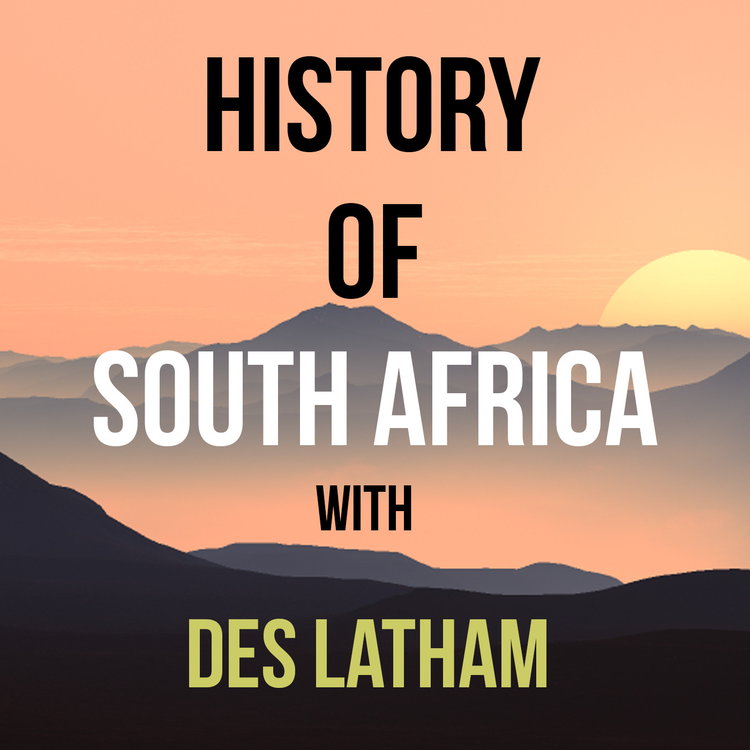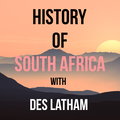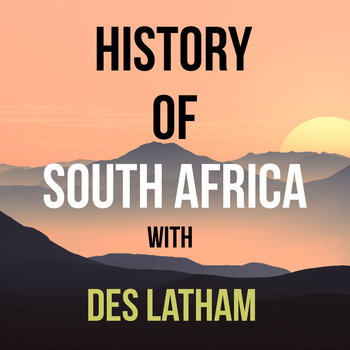
Episode 141 — An ode to the Orange River and San spoor blows in the wind
Loading player...
Welcome back to the History of South Africa podcast with me your host, Des Latham. This is episode 141.
First a little admin - a big thank you to for tuning in. This series has passed one million listens, the response has been staggering.
When I began planning the history of South Africa podcast three years ago, it was literally a step into the deep end of audio production.
Nothing can truly prepare you for such an enterprise — and this is a solo job. It’s me, the hundreds of books collected over decades, the journals, the papers, the travel, the experience and you, the listener.
So without resorting to too much grandiose baloney, let me just say thank you. Without your support and wonderful emails and messages, this would have been an awful lot harder.
With that little detour out of the way, back to our story for this week.
We need to switch our gaze back to the northern Cape, circa 1838 and 9, and spend time discussing what was going on along the Orange River that in many ways is similar to the Nile and the Niger Rivers. The Orange River is smaller, but it also flows through an extremely arid zone like the Nile and the Niger, and like those waterways, it is a lifeline for animal and human life over a large area.
It was towards this riparian zone that the colonists were expanding, and ahead of them the Khoe, the Oorlam, the !Kora.
Then the Voortrekkers left in their hundreds, the flood turning to thousands, they weakened the Cape frontier substantially because it was a loss of military power. This happened as the trekkers themselves destabilised the interior of the country, and the British administration feared that they’d face dispossessed Africans who would become a nightmare as they entered the Cape, economic and war refugees.
Examples were the amaMfengu who had fled the Mfecane, now they faced more destabilisation as hundreds of men riding horses and carrying guns made their way out of the Cape.
By this time in the colony, most of previous Governor Benjamin D’Urban’s comprehensive programme of reforms had been accomplished, including the establishment of a Legislative Council, the introduction of a Revised charter of Justice, emancipation of the slaves and the beginnings of municipal government so that the locals could manage themselves.
As we continue with the series, that narrative of haste will be our companion. When we look at the goings on, we must extend our gaze beyond the borders, most of which are merely lines on maps. Regions are tied together through the shared use of water and other resources. In this episode we’re going to look north, and try to understand the link between the people of the Cape, and the people of Namibia.
Two people in particular. The San and the Oorlam and their relationship with the Orange River.
Between 1800 and 1839 the San had been virtually exterminated as a people. They had stood in the way of the first trekboers through the turn of the century, and the expansion could only continue into the welcoming environment of the eastern transOrangia region after the San of the Sneeuberg had been pacified.
This had been both a violent and a subtle and insidious practice, including gift giving, mainly alcohol. Even peaceful trekkers had undermined the San resistance by pure dint of infiltration into their territory. Once the colonists had established themselves beyond the Sneeuberg, the San were unable to prevent the destruction of their lifestyle. It was a similar story for the Khoekhoe.
Those who were not killed or captured retreated deep into the deserts or the inhospital areas of Bushmansland so that they could survive.
The !Kora were various clans who lived in a fluid situation in the interior of the country, and anyone who chose a raiding, roving mode of existence were likely to be called Koranna regardless of their ancestry.
But they had made excellent use of two major introductions into South Africa.
The Gun and the horse.
First a little admin - a big thank you to for tuning in. This series has passed one million listens, the response has been staggering.
When I began planning the history of South Africa podcast three years ago, it was literally a step into the deep end of audio production.
Nothing can truly prepare you for such an enterprise — and this is a solo job. It’s me, the hundreds of books collected over decades, the journals, the papers, the travel, the experience and you, the listener.
So without resorting to too much grandiose baloney, let me just say thank you. Without your support and wonderful emails and messages, this would have been an awful lot harder.
With that little detour out of the way, back to our story for this week.
We need to switch our gaze back to the northern Cape, circa 1838 and 9, and spend time discussing what was going on along the Orange River that in many ways is similar to the Nile and the Niger Rivers. The Orange River is smaller, but it also flows through an extremely arid zone like the Nile and the Niger, and like those waterways, it is a lifeline for animal and human life over a large area.
It was towards this riparian zone that the colonists were expanding, and ahead of them the Khoe, the Oorlam, the !Kora.
Then the Voortrekkers left in their hundreds, the flood turning to thousands, they weakened the Cape frontier substantially because it was a loss of military power. This happened as the trekkers themselves destabilised the interior of the country, and the British administration feared that they’d face dispossessed Africans who would become a nightmare as they entered the Cape, economic and war refugees.
Examples were the amaMfengu who had fled the Mfecane, now they faced more destabilisation as hundreds of men riding horses and carrying guns made their way out of the Cape.
By this time in the colony, most of previous Governor Benjamin D’Urban’s comprehensive programme of reforms had been accomplished, including the establishment of a Legislative Council, the introduction of a Revised charter of Justice, emancipation of the slaves and the beginnings of municipal government so that the locals could manage themselves.
As we continue with the series, that narrative of haste will be our companion. When we look at the goings on, we must extend our gaze beyond the borders, most of which are merely lines on maps. Regions are tied together through the shared use of water and other resources. In this episode we’re going to look north, and try to understand the link between the people of the Cape, and the people of Namibia.
Two people in particular. The San and the Oorlam and their relationship with the Orange River.
Between 1800 and 1839 the San had been virtually exterminated as a people. They had stood in the way of the first trekboers through the turn of the century, and the expansion could only continue into the welcoming environment of the eastern transOrangia region after the San of the Sneeuberg had been pacified.
This had been both a violent and a subtle and insidious practice, including gift giving, mainly alcohol. Even peaceful trekkers had undermined the San resistance by pure dint of infiltration into their territory. Once the colonists had established themselves beyond the Sneeuberg, the San were unable to prevent the destruction of their lifestyle. It was a similar story for the Khoekhoe.
Those who were not killed or captured retreated deep into the deserts or the inhospital areas of Bushmansland so that they could survive.
The !Kora were various clans who lived in a fluid situation in the interior of the country, and anyone who chose a raiding, roving mode of existence were likely to be called Koranna regardless of their ancestry.
But they had made excellent use of two major introductions into South Africa.
The Gun and the horse.

